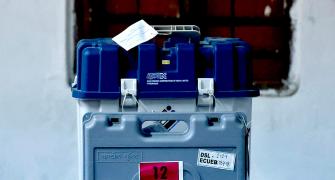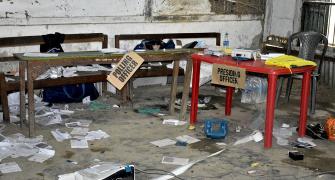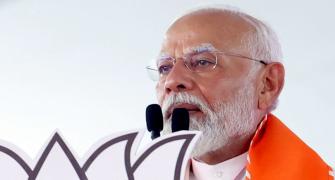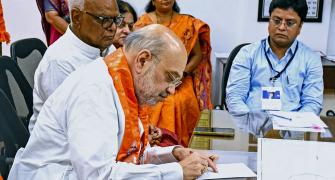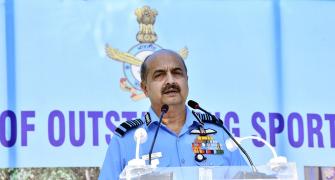The Left parties' opposition to the India-United States nuclear deal is not the only crisis that faces Prime Minister Manmohan Singh and what could soon be a minority United Progressive Alliance government.
Even if the prime minister survives this scare, the issues of the expected price rise of petroleum products and the soon-to-happen joint naval exercises with the United States, Japan and Australia in September will give rude jolts to the prime minister.
Unless the Congress-led UPA government is ready to put the nuclear deal on the backburner and suspend any talks for the remaining term of the government, the Left parties will not extend their all-important support.
N-deal: Read all the latest on the UPA-Left stand-off
That the 123 Agreement -- and in some sense even the nuclear cooperation agreement itself -- was unacceptable to the Left was a known fact. The only reason the Left parties' displeasure was not taken seriously till now is due to the Congress-fed argument that the Left will never allow 'communal forces' like the Bharatiya Janata Party to gain momentum even by mistake.
'Jayenge kahan?' was the common and complacent refrain. 'The Left never had it so good so they want to cling to power as much as the Congress and its allies' was the common argument put forward by the anti-Left critics.
In a sarcastic tone, the critics even used to ask the Left leaders: 'Is communalism a bigger issue than the increasing influence of 'imperial' America in India?'
Also read: Experts dissect the 123 Agreement
The Leftists being Leftists, kept responding all the while, 'We will react when we see the final version of the 123 Agreement.'
Now, the defining moment has arrived. The Left parties have stood up to save their 'identity' and secure their own long-term future.
They had to show their mettle, thanks in no small measure to an interview given by the prime minister, where he dared them to withdraw support to his government.
Now, with the Left dealing a body blow to the government, the prime minister and UPA chairperson Sonia Gandhi have been forced to think about the pros and cons of a possible delay in operationalising the deal.
External Affairs Minister Paranab Mukherjee consulted Foreign Secretary Shiv Shankar Menon on Saturday.
However, it must be noted that so far, neither Dr Singh nor the Congress party or any of the UPA allies have said publicly whether they are backing out of the deal or are having any rethinking on delaying the process to make the 123 Agreement operational.
But, obviously, the politics of the supporters and opponents of nuclear deal has turned grave and real. It will have certain diplomatic fall-outs.
As part of its negotiations with the Left, if the UPA government decides to freeze the deal, what will be the diplomatic consequences?
Strategic thinker K Subrahmanyam, whose line of thought on the nuclear deal can be said to be similar to that of the prime minister, told rediff.com, "If India does not proceed with the deal it is a clear message to Russia, France, Germany, Japan and other powers who want to see a multi-polar world that India does not want to play a role in that world."
Subrahmanyam is worried that not only will India lose an opportunity, "It will also leave Asia to be dominated by China. It will allow Indian talent to be exploited by the US without giving India access to high technology in the international sphere," he says. "China has used Pakistan as a surrogate threat to India by arming it with missiles and nuclear weapons. Now our domestic opposition will come in handy in keeping India down perpetually."
Naresh Chandra, former Indian Ambassador to the US, told rediff.com, "There is no harm in the discussion as desired by the Left on the issue of the nuclear deal. Some of the issues concerning the future have to be addressed and that can't be a disadvantage. But the cancellation of the deal will have consequences. India will lose a golden opportunity. History will be harsh on how we messed up an opportunity.
"It will be a terrific achievement for China, which continues to get frontier technology while India is deprived of it. We will not get dual technology. We will not get missile technology, supercomputers and technology to expand the space sector."
However, many other diplomats rediff.com talked to were not so pessimistic.
Former foreign secretary K Raghunath said, "Nobody can give you an easy answer to this question. China has certain views. But India has to keep pressing its own agenda."
Raghunath is not worried that internal politics over the nuclear deal or any decision on the 123 Agreement will be a great setback of any kind on the international stage.
He said, "The world takes India seriously. It takes Indian politics as a stable entity. In some countries like China internal disagreements are a hidden process, while you know how debates in the US elections are going on."
Chandra, trying to paint a realistic scenario, says, "There is no doubt that if you are being seen as having adverse relations with the US, then some members of the Non Aligned Movement will be clapping, but that will have an impact on India's relations with countries like Japan."
There is nothing "legally binding" on India to scrap or delay the deal, but most diplomats are wary of it.
Brajesh Mishra, who is opposed to the deal, said, "I would not like to talk about the implications of delaying the 123 Agreement on the Indo-US bilateral relations, because at the moment it is a political game!"


